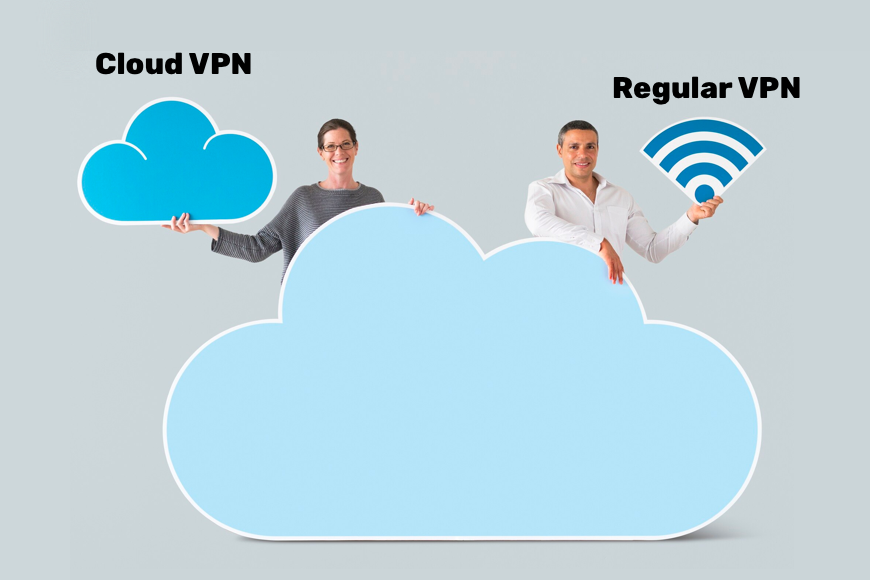VPNs have become an essential tool for ensuring a secure connection between your device and a particular network. However, a better and more flexible solution has been introduced: Cloud VPN. In this article, you can learn about Cloud VPN, including its usage, benefits and disadvantages.
Understanding Cloud VPN
With most companies deciding to use the cloud to store and share data, Cloud VPNs have become a widely used method for helping those who work remotely, safeguarding cloud servers, and granting access to the data kept on them. It enables users to initiate secure connections to remote networks over the internet. Cloud VPNs also eliminate the need for on-premise infrastructure which is required for normal VPNs.
How Does Cloud VPN Work?
The task of a Cloud VPN is to connect your peer network to your virtual private cloud (VPC) network through an IPsec connection. The IPsec protocol creates a virtual encrypted tunnel over the internet, which makes sure that the data transmitted between your peer network and the VPC network is protected from unauthorized access. The traffic traveling between the two networks is encrypted by one gateway and decrypted by the other gateway.
Types of Cloud VPN
Cloud VPNs are divided into two main types, depending on how they are used.
- Client cloud VPN
- Network cloud VPN
Client Cloud VPN
The purpose of a client cloud VPN is to give access to IP addresses outside a business’s network to connect to the corporate network. This provides them with access to the information on the cloud VPN server from any location while still having a secure connection.
Network Cloud VPN
The purpose of a network cloud VPN is to create a secure, encrypted network between the on-premise network and the cloud. Unlike the client cloud VPN, this type requires a VPN appliance that must be connected to the network.
Examples of Popular Cloud VPNs
The Cloud VPNs below provide the most features such as identity-driven access control, multi-location connectivity, load balancing and kill switches to protect against accidental disconnections. They also have the most competitive prices on the market.
- Perimeter 81
- Good Access
- NordLayer
- VyprVPN for Business
- CyberGhost
- Surfshark
- Norton Secure VPN
- Twingate
- Windscribe ScribeForce
- Express VPN
General Benefits of Using a Cloud VPN
Cloud VPNs provide a set of advantages that normal VPNs just can’t seem to provide. Let's look at some features that make cloud VPNs stand out.
-
Better Scalability and Global Accessibility
Cloud VPNs provide global access to users, allowing them to utilize applications, data and files from any location. This is achieved through a cloud server that is connected to the internet, making the services available to the user via the cloud platform.
Normal VPNs are no longer an efficient option, as they require users to route through a data center before they can use SaaS applications. Cloud VPNs, however, can provide direct, speedy and secure access to these cloud-based resources, making them a more practical solution for cloud access.
-
Good User Experience
Using a Cloud VPN service, people can securely connect to private networks no matter where they are. This ensures a smooth user experience, allowing employees to access networks and resources just as they would if they were physically in the workplace.
-
Increased Security
Cloud VPN solutions provide a reliable way to verify users before granting them access to a company's network. This can be achieved through various methods, such as two-factor authentication and biometric verification. These verification systems use the most up-to-date technology, so you can be sure they are effective.
-
Greater Stability
Virtualization increases the steadiness and dependability of a Cloud VPN by offering resource separation, backup, expandability, elimination of faulty components and simplified upkeep and updates.
-
Mobile Support
Most people like to use their mobile devices for their work activities when they are on the go or from the leisure of their homes. It is difficult to use normal VPNs on mobile devices, and once again, Cloud VPNs have the answer, as they provide better usability for people who prefer to use mobile devices.
Limitations and Considerations
Amidst all these advantages, there are some disadvantages that users must be aware of. The disadvantages below must be considered before deciding to use a cloud VPN.
-
Scalability and Cost
With the increase in the number of users and data traffic, the need to scale your Cloud VPN will arise and it will be a challenge for certain small-scale organizations. Organizations will have to expand their VPN infrastructures in order to accommodate the growth, and this may result in additional costs which have to be borne by the company.
-
Security Risks
Although VPNs specialize in providing a secure and encrypted connection, attackers can always exploit vulnerabilities in the VPN infrastructure. Also, companies are made into targets by attackers when they rely on a single VPN as this creates a single point of failure.
Use Cases of Cloud VPNs
There are many reasons why a user would consider using a Cloud VPN. Some of these reasons are mentioned below.
- Remote work - With the use of a Cloud VPN, employees of a company could access company resources remotely.
- Multi-cloud connectivity - Companies could use Cloud VPNs in order to create secure links between different cloud environments.
- Cloud-first companies - With many organizations moving their systems into the cloud, using Cloud VPNs is a great way to provide safe access to SaaS apps or cloud repositories.
Best Practices for Cloud VPNs
There are a few practices that an organization should consider using in order to get the maximum use out of their Cloud VPNs. Following these practices will guarantee a more efficient outcome.
- Use strong passwords - Always use passwords and keys that are not available in your company’s virtual private cloud. This adds another layer of security in addition to the one provided by the Cloud VPN.
- Apply firewall rules in gateways - By applying firewall rules in gateways, companies have the ability to control the amount of traffic traveling through the Cloud VPN tunnels.
- Use dynamic routing configurations - After the deployment of dynamic routing configurations, the cloud VPN can use border gateway protocol and support active/passive tunnel configurations to tighten up security.
Final Thoughts
With the growing number of off-site employees and cloud-based resources, it is not efficient to route all traffic through the company network. This article has shown you many advantages that a Cloud VPN provides over traditional VPN platforms.
There has been a massive rise in the use of cloud VPNs as a direct result of the COVID-19 pandemic. This is because companies realized that it was difficult for them to meet the needs of a completely remote workforce.
Setting up and managing Cloud VPNs is simple and doesn't require any specialized know-how. Their cloud delivery makes them ideal for connecting many devices in far-flung places since they can easily be scaled up. Furthermore, they are secure. With all these positives, Cloud VPNs have started to make more sense as more and more companies start moving their infrastructure to the cloud.

